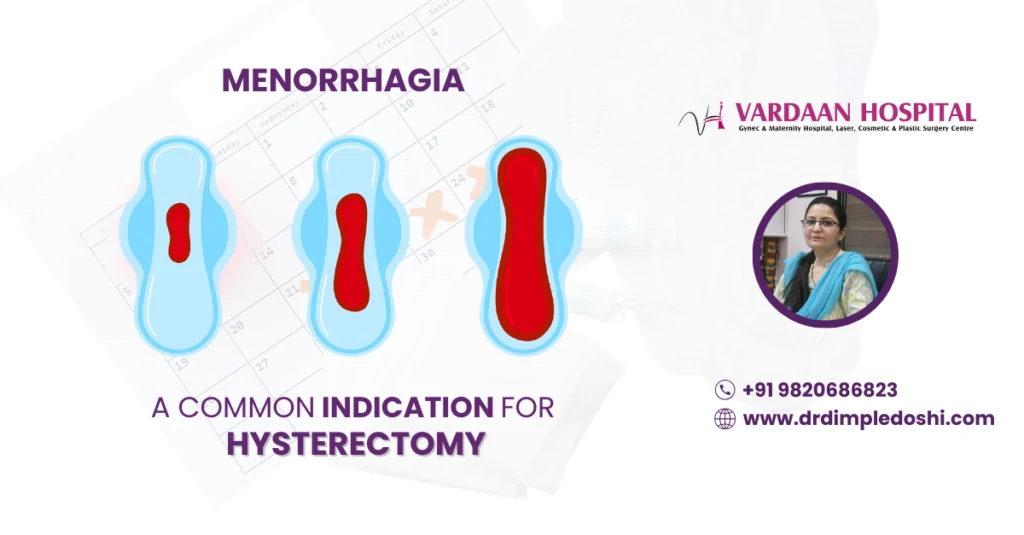Menorrhagia: Expert Solutions for Heavy Menstrual Bleeding
By Dr. Dimple Doshi | 27+ Years of Experience | 25,000+ Surgeries | 3D Laparoscopy Expert

Heavy Periods Disrupting Your Life? It Could Be Menorrhagia
Are you experiencing menstrual bleeding so heavy that you soak pads or tampons every hour, pass large blood clots, or feel exhausted after your periods? These could be signs of menorrhagia—a condition many women ignore until it starts affecting daily life.
Heavy periods aren’t just an inconvenience—they can lead to anemia, weakness, and severe lifestyle disruptions. Many women silently suffer, assuming it’s “normal,” while their energy, productivity, and confidence take a hit every month.
The good news? Menorrhagia is treatable. From advanced medications to minimally invasive procedures, there are safe and effective ways to control heavy bleeding and restore your health.
At Vardaan Hospital, Dr. Dimple Doshi offers personalized evaluation and expert treatment to help you regain comfort and confidence in your menstrual cycle.
What Is Menorrhagia (Heavy Periods)?
Menorrhagia refers to abnormally heavy or prolonged menstrual bleeding that disrupts daily life. If bleeding lasts over 7 days, includes large clots, or soaks pads hourly—it’s not normal and needs medical attention.
- Synonyms: Heavy menstrual bleeding, abnormal uterine bleeding (AUB), prolonged periods, excessive menstrual flow, flooding menstruation.
What Is the Incidence of Menorrhagia in Women?
Globally, menorrhagia affects about 9–14% of women in their reproductive years. In India, prevalence ranges between 17–20%, making it a leading cause of gynecological visits.
What Are the Symptoms of Menorrhagia?
Watch for these signs of heavy menstrual bleeding:
- Bleeding longer than 7 days
- Soaking one or more pads/tampons every hour
- Passing clots larger than 1 inch
- Waking at night to change protection
- Fatigue, dizziness, shortness of breath (due to anemia)
- Pelvic pressure or cramping
How Do Heavy Periods Affect Your Life and Health?
Menorrhagia doesn’t just affect your periods—it impacts your overall well-being:
- Avoiding travel, work, or social events
- Constant fear of leaks and stains
- Chronic fatigue, irritability, and mood swings
- Relationship stress and reduced confidence
Emotional Impact: “I dreaded every cycle and planned my life around my bleeding.”
What Are the Causes of Heavy Menstrual Bleeding?
Menorrhagia can result from multiple underlying conditions:
- Structural Causes: Fibroids, adenomyosis, polyps, endometrial hyperplasia, endometriosis
- Hormonal Causes: PCOS, perimenopause, thyroid disorders, obesity-related estrogen dominance
- Infections: Chronic pelvic inflammatory disease (PID)
- Drug-Induced: Anticoagulants, NSAIDs, hormone therapies
- Malignancy: Endometrial or cervical cancer (must be ruled out)
What Are the Risk Factors for Menorrhagia?
- Family history of bleeding disorders or AUB
- Obesity and lifestyle-related hormonal imbalances
- History of fibroids or endometrial abnormalities
- Prolonged use of certain medications (e.g., anticoagulants)
How Is Menorrhagia Diagnosed?
Diagnosis involves detailed history, clinical evaluation, and investigations:
- Menstrual diary and symptom review
- Physical and pelvic examination
- Transvaginal ultrasound (TVS)
- Blood tests: Hemoglobin, thyroid profile, hormone levels, clotting tests
- Endometrial biopsy (if age >35 or irregular bleeding)
- Hysteroscopy for uterine cavity visualization
- MRI for complex fibroids or adenomyosis
What Are the Possible Complications of Untreated Menorrhagia?
- Severe anemia leading to weakness and heart strain
- Chronic fatigue and reduced immunity
- Infertility or recurrent miscarriages
- Endometrial hyperplasia or cancer risk
When Should You Seek Medical Help for Menorrhagia?
Contact your gynecologist if you experience:
- Bleeding lasting more than 7 days
- Soaking pads/tampons hourly
- Severe fatigue, dizziness, or breathlessness
- Large or frequent blood clots
- Bleeding between periods, post-sex, or after menopause
What Are the Treatment Options for Menorrhagia in Mumbai?
Treatment is tailored to cause, age, and fertility goals:
- Medical: Tranexamic acid, hormonal pills, progestins, Mirena IUD, iron supplements
- Minimally Invasive: Hysteroscopy for polyp/fibroid removal, endometrial ablation
- Advanced Surgery: 3D laparoscopic myomectomy or hysterectomy using Karl Storz Rubina 4K system
What Lifestyle Changes Can Help Reduce Heavy Periods?
- Maintain a healthy weight and balanced diet
- Take iron-rich foods and supplements
- Avoid self-medication and excessive painkillers
- Manage stress with yoga and relaxation techniques
Why Choose Dr. Dimple Doshi for Menorrhagia Treatment in Mumbai?
- 27+ years of gynecology expertise
- Pioneer in 3D laparoscopy for AUB and fibroids
- Empathetic, patient-first approach
- Comprehensive care at Vardaan Hospital, Goregaon
Which Is the Best Hospital for Menorrhagia Treatment in Goregaon, Mumbai?
Vardaan Hospital offers advanced diagnostic tools, minimally invasive procedures, and compassionate care under the leadership of Dr. Dimple Doshi.
FAQs – Heavy Periods and Menorrhagia Management
Q1. How long does menorrhagia usually last?
Ans. Menorrhagia typically lasts longer than 7 days, which is considered abnormal for menstrual bleeding.Q2. How much blood loss is considered heavy during a period?
Ans. Losing more than 80 ml of blood per cycle or soaking through a pad/tampon every 1–2 hours is considered heavy bleeding.Q3. What are the common complications of untreated menorrhagia?
Ans. Untreated menorrhagia can lead to severe anemia, fatigue, dizziness, and in rare cases, heart complications.Q4. Can menorrhagia affect fertility?
Ans. Yes, chronic heavy periods may indicate underlying conditions like PCOS or fibroids, which can impact fertility.Q5. What foods should you avoid during heavy periods?
Ans. Avoid high-salt, processed foods, and caffeine as they can worsen bloating and discomfort during heavy periods.Q6. Can stress cause menorrhagia?
Ans. While stress doesn’t directly cause menorrhagia, it can disrupt hormonal balance, potentially leading to irregular or heavy bleeding.Q7. Is menorrhagia linked to PCOS?
Ans. Yes, PCOS can cause irregular cycles and heavy bleeding, but menorrhagia can also occur without PCOS.Q8. Can you get pregnant if you have menorrhagia?
Ans. Yes, pregnancy is possible, but it may be challenging if the heavy bleeding is due to hormonal imbalance or other underlying issues.Q9. What is the first-line treatment for menorrhagia?
Ans. The first line of treatment includes medications like NSAIDs, tranexamic acid, or hormonal therapy, depending on the cause.Q10. When should you go to the hospital for heavy periods?
Ans. If you are soaking a pad every hour for several hours or feel dizzy, weak, or short of breath, seek emergency care immediately.Q11. What vitamin deficiencies can worsen heavy bleeding?
Ans. Iron and Vitamin K deficiencies can contribute to prolonged or heavy menstrual bleeding.Q12. Can heavy periods be controlled without surgery?
Ans. Yes, most cases of menorrhagia are managed with medication, hormonal therapy, and lifestyle changes before considering surgery.Q13. What is the role of diet in managing menorrhagia?
Ans. A diet rich in iron, Vitamin C, and folate helps replenish lost nutrients and reduce anemia caused by heavy periods.Q14. How do doctors diagnose the cause of heavy bleeding?
Ans. Diagnosis may involve blood tests, ultrasound, hysteroscopy, or endometrial biopsy to identify underlying causes.Q15. Can hormonal birth control help with menorrhagia?
Ans. Yes, birth control pills or hormonal IUDs are often prescribed to regulate menstrual flow and reduce heavy bleeding.Medical Code for Menorrhagia
ICD-10 Codes for Menorrhagia (Heavy Menstrual Bleeding)
| ICD-10 Code | Description |
|---|---|
| N92.0 | Excessive and frequent menstruation with regular cycle |
| N92.1 | Excessive and frequent menstruation with irregular cycle |
| N92.2 | Excessive menstruation at puberty |
| N92.3 | Ovulation bleeding |
| N92.4 | Excessive bleeding in premenopausal period |
| N92.5 | Other specified irregular menstruation |
CPT Codes for Menorrhagia Evaluation & Treatment
| CPT Code | Description |
|---|---|
| 99213 | Office or outpatient visit for evaluation and management (low complexity) |
| 99214 | Office or outpatient visit for evaluation and management (moderate complexity) |
| 76830 | Transvaginal ultrasound for uterine evaluation |
| 76856 | Pelvic ultrasound, complete |
| 58100 | Endometrial biopsy (sampling of uterine lining) |
| 58555 | Hysteroscopy, diagnostic (to evaluate uterine cavity) |
| 58558 | Hysteroscopy with removal of lesion or biopsy (endometrial) |
| 58563 | Hysteroscopic endometrial ablation for heavy bleeding |
| 96372 | Therapeutic injection (e.g., hormonal treatment) |
Take charge of your health today.
Book your consultation with Dr. Dimple Doshi at
Vardaan Hospital, Goregaon West, Mumbai.


 WhatsApp
WhatsApp +91-9820686823
+91-9820686823 Book Appointment
Book Appointment